62.4.6 (62 > 52)
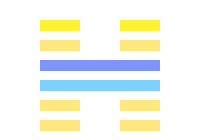
62.4.6 (62 > 52) - THE HSIÂO KWO HEXAGRAM.
- 4. The fourth line, undivided, shows its subject falling into no error, but meeting (the exigency of his situation), without exceeding (in his natural course). If he go forward, there will be peril, and he must be cautious. There is no occasion to be using firmness perpetually.
- 6. The sixth line, divided, shows its subject not meeting (the exigency of his situation), and exceeding (his proper course). (It suggests the idea of) a bird flying far aloft. There will be evil. The case is what is called one of calamity and self- produced injury.
62.4.6 (62 > 52) - Exiting
One neglects to tell others what one has decided for their future
Bing DeepL Google Yandex62.4.6 (62 > 52) - Exiting
One neglects to tell others what one has decided for their future
Bing DeepL Google Yandex62.4.6 (62 > 52) - Siao kouoh, la prépondérance du petit
Siaō kouoh : (petit, peu, ou des petits), avancement, manquement, défaut, avancer, dépasser, passer à côté, transgresser.
-
4. Sans avoir commis de faute ni excédé, manqué en rien, il peut survenir des dangers, des rencontres à craindre ; que l’on soit toujours en garde, car autrement on ne peut avoir une prospérité toujours constante.
A la fin, elle ne pourra durer. -
6. Ne rencontrer personne qui nous dépasse, comme l’oiseau volant qui laisse tout en dessous, cela peut s’appeler un mal, une chose funeste.
On devient orgueilleux, opiniâtre.
62.4.6 (62 > 52) - Sortir
On néglige de dire aux autres ce que l'on a décidé pour leur avenir
Bing DeepL Google Yandex62.4.6 (62 > 52) - Kijárat
- 4. Utat ad.
- 6. Ha valaki túl messzire megy, a többiek elhagyják és valami eltörik.
The trigrams
The trigrams are combinations of three yin and yang lines. The three bottom lines of the hexagram form the lower trigram and represent the inner situation. The three top lines form the upper trigram and represent the outer situation.
Upper trigram: The thunder The mountain


Lower trigram: The mountain

The formation: 62
What is already there
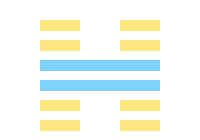
62 - THE HSIÂO KWO HEXAGRAM.
Hsiâo Kwo indicates that (in the circumstances which it implies) there will be progress and attainment. But it will be advantageous to be firm and correct. (What the name denotes) may be done in small affairs, but not in great affairs. (It is like) the notes that come down from a bird on the wing ;---to descend is better than to ascend. There will (in this way) be great good fortune.
Bing DeepL Google Yandex62 - Siao kouoh, la prépondérance du petit
Siaō kouoh : (petit, peu, ou des petits), avancement, manquement, défaut, avancer, dépasser, passer à côté, transgresser.
Siao kouo « petite supériorité (ou des petits) ». Dans tous leurs stades de développement, les petits sont capables de petites choses et pas de grandes. C’est comme le son laissé par le passage d’un oiseau volant, il ne peut pas grandir (s’élever), mais uniquement diminuer (ou baisser) 3.
3 Suite et opposition au n° 28
Texte
Petit avancement. En toute la série de ses actes, le petit peut faire de petites choses, mais point de grandes. C’est comme le bruit fait par le passage d’un oiseau, il ne peut pas grandir, mais seulement diminuer, baisser (Ier sens).
Symbolisme
Cet hexagramme représente le tonnerre au-dessus d’une montagne. Kouoh est manquement. — Le sage, dans ses actions ordinaires, manque par respect insuffisant. — En cas de deuil, on manque quant aux vêtements ; dans les dépenses journalières, on manque par rapport à l’économie.
Commentaire
Si en avançant le petit agit selon les circonstances et qu’il garde le juste milieu, les petites affaires qu’il fera réussiront. Le fort qui perd sa dignité et ne garde pas le milieu ne peut plus, par cela même, rien faire de grand. Il est représenté ici sous la figure de l’oiseau volant ; le bruit de son vol ne peut s’élever, mais uniquement diminuer. — Le grand résiste, le petit cède.
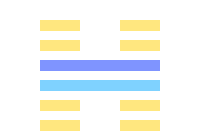
62.4 (62 > 15) - THE HSIÂO KWO HEXAGRAM.
The fourth line, undivided, shows its subject falling into no error, but meeting (the exigency of his situation), without exceeding (in his natural course). If he go forward, there will be peril, and he must be cautious. There is no occasion to be using firmness perpetually.
Bing DeepL Google Yandex62.4 (62 > 15) - Siao kouoh, la prépondérance du petit
Siaō kouoh : (petit, peu, ou des petits), avancement, manquement, défaut, avancer, dépasser, passer à côté, transgresser.
Sans avoir commis de faute ni excédé, manqué en rien, il peut survenir des dangers, des rencontres à craindre ; que l’on soit toujours en garde, car autrement on ne peut avoir une prospérité toujours constante.
A la fin, elle ne pourra durer.
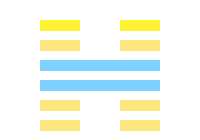
62.6 (62 > 56) - THE HSIÂO KWO HEXAGRAM.
The sixth line, divided, shows its subject not meeting (the exigency of his situation), and exceeding (his proper course). (It suggests the idea of) a bird flying far aloft. There will be evil. The case is what is called one of calamity and self- produced injury.
Bing DeepL Google Yandex62.6 (62 > 56) - Climbing too high
When one goes too far, the others give up, and one breaks something.
Bing DeepL Google Yandex62.6 (62 > 56) - Climbing too high
When one goes too far, the others give up, and one breaks something.
Bing DeepL Google Yandex62.6 (62 > 56) - Siao kouoh, la prépondérance du petit
Siaō kouoh : (petit, peu, ou des petits), avancement, manquement, défaut, avancer, dépasser, passer à côté, transgresser.
Ne rencontrer personne qui nous dépasse, comme l’oiseau volant qui laisse tout en dessous, cela peut s’appeler un mal, une chose funeste.
On devient orgueilleux, opiniâtre.
62.6 (62 > 56) - Monter trop haut
Quand on va trop loin, les autres abandonnent, et on casse quelque chose.
Bing DeepL Google Yandex62.6 (62 > 56) - Kijárat
Ha valaki túl messzire megy, a többiek elhagyják és valami eltörik.
Bing DeepL Google YandexIn the making: 52
What is poised to happen
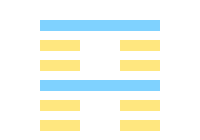
52 - THE KĂN HEXAGRAM.
When one's resting is like that of the back, and he loses all consciousness of self; when he walks in his courtyard, and does not see any (of the persons) in it, there will be no error.
Bing DeepL Google Yandex52 - Stop
One recognizes that it is time to stop because one needs to feed oneself.
Bing DeepL Google Yandex52 - Stop
One recognizes that it is time to stop because one needs to feed oneself.
Bing DeepL Google Yandex52 - Kán, l’arrêt
Kán : ferme, tenir droit, bien réglé, arrêter, reposer
Kan « ferme ». L’homme ferme tourne le dos et s’oppose résolument, sans tenir compte de lui-même. S’il traverse un endroit, il ne regarde pas qui y est et ne faillit point.
Texte
L’homme ferme s’oppose résolument (au mal) sans tenir compte de lui-même. Devant traverser un endroit, il ne regarde pas qui s’y trouve (mais le fait résolument) et ne faillit point.
Symbolisme
Deux montagnes superposées forment le Koua. Ainsi l’homme supérieur pense à ne pas dépasser les bornes de ses fonctions.
Commentaire
Kán signifie s’arrêter, tenir ferme, en bon ordre, agir ou s’arrêter selon l’occasion. Quand l’acte et sa cessation ont lieu en temps convenable, la conduite est belle et intelligente. « Rester à sa place », cela veut dire que les grands et les petits sont en rapport, mais sans usurpation ni entre-croisement. Celui qui est ferme et attentif à son devoir ne se recherche pas lui-même. Marchant dans son jardin, il ne voit pas même qui s’y trouve.
Note. Tout ceci illustre le sens « tenir droit, bien réglé » et se réfère aux rites du maintien extérieur qui prescrivent de se tenir toujours droit et de ne pas même s’asseoir sur un siège qui n’est pas droit.
52 - Cesser
On reconnaît qu'il est temps de s'arrêter car on a besoin de s'alimenter.
Bing DeepL Google Yandex52 - Megállás
Felismeri hogy itt az ideje megállni mert a többieket táplálni kell.
Bing DeepL Google YandexThe nuclear hexagram: 28.3.5 (28 > 40)
The nuclear hexagram is the association of the two inner trigrams (lines 2,3,4 and 3,4,5). It represents the root, or the origin of the situation.
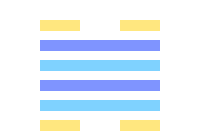
28.3.5 (28 > 40) - THE TÂ KWO HEXAGRAM.
- 3. The third line, undivided, shows a beam that is weak. There will be evil.
- 5. The fifth line, undivided, shows a decayed willow producing flowers, or an old wife in possession of her young husband. There will be occasion neither for blame nor for praise.
28.3.5 (28 > 40) - Making a flop
One becomes the target of mockery when others learn that one has been disappointing.
Bing DeepL Google Yandex28.3.5 (28 > 40) - Making a flop
One becomes the target of mockery when others learn that one has been disappointing.
Bing DeepL Google Yandex28.3.5 (28 > 40) - Tá kvoh, le grand excès
Tá kvoh : 1. Grand excès, défaut, manquement ; 2. Traverser, dépasser.
- 3. Une poutre, un pilier trop faible (voir texte I) sont mauvais (ils ne peuvent supporter) (grand défaut).
- 5. Un vieux saule produisant une fleur, une vieille femme épousant un homme encore jeune, quoique non blâmables, ne peuvent être loués. La fleur du vieux saule ne peut durer, l’époux d’une vieille femme peut s’en dégoûter. (Faits qui passent les règles ordinaires.)
28.3.5 (28 > 40) - Faire un flop
On devient la cible de moqueries quand les autres apprennent qu'on a été décevant.
Bing DeepL Google Yandex28.3.5 (28 > 40) - Lemondás
- 3. Ápolja kapcsolatait.
- 5. Igyekszik javítani mielőtt mások észrevennék a hanyatlást.
Ruler
The starting situation

62.6 (62 > 56) - THE HSIÂO KWO HEXAGRAM.
The sixth line, divided, shows its subject not meeting (the exigency of his situation), and exceeding (his proper course). (It suggests the idea of) a bird flying far aloft. There will be evil. The case is what is called one of calamity and self- produced injury.
Bing DeepL Google Yandex62.6 (62 > 56) - Climbing too high
When one goes too far, the others give up, and one breaks something.
Bing DeepL Google Yandex62.6 (62 > 56) - Climbing too high
When one goes too far, the others give up, and one breaks something.
Bing DeepL Google Yandex62.6 (62 > 56) - Siao kouoh, la prépondérance du petit
Siaō kouoh : (petit, peu, ou des petits), avancement, manquement, défaut, avancer, dépasser, passer à côté, transgresser.
Ne rencontrer personne qui nous dépasse, comme l’oiseau volant qui laisse tout en dessous, cela peut s’appeler un mal, une chose funeste.
On devient orgueilleux, opiniâtre.
62.6 (62 > 56) - Monter trop haut
Quand on va trop loin, les autres abandonnent, et on casse quelque chose.
Bing DeepL Google Yandex62.6 (62 > 56) - Kijárat
Ha valaki túl messzire megy, a többiek elhagyják és valami eltörik.
Bing DeepL Google YandexCorrection
The direction where the ruler is going to bend

62.4 (62 > 15) - THE HSIÂO KWO HEXAGRAM.
The fourth line, undivided, shows its subject falling into no error, but meeting (the exigency of his situation), without exceeding (in his natural course). If he go forward, there will be peril, and he must be cautious. There is no occasion to be using firmness perpetually.
Bing DeepL Google Yandex62.4 (62 > 15) - Siao kouoh, la prépondérance du petit
Siaō kouoh : (petit, peu, ou des petits), avancement, manquement, défaut, avancer, dépasser, passer à côté, transgresser.
Sans avoir commis de faute ni excédé, manqué en rien, il peut survenir des dangers, des rencontres à craindre ; que l’on soit toujours en garde, car autrement on ne peut avoir une prospérité toujours constante.
A la fin, elle ne pourra durer.

